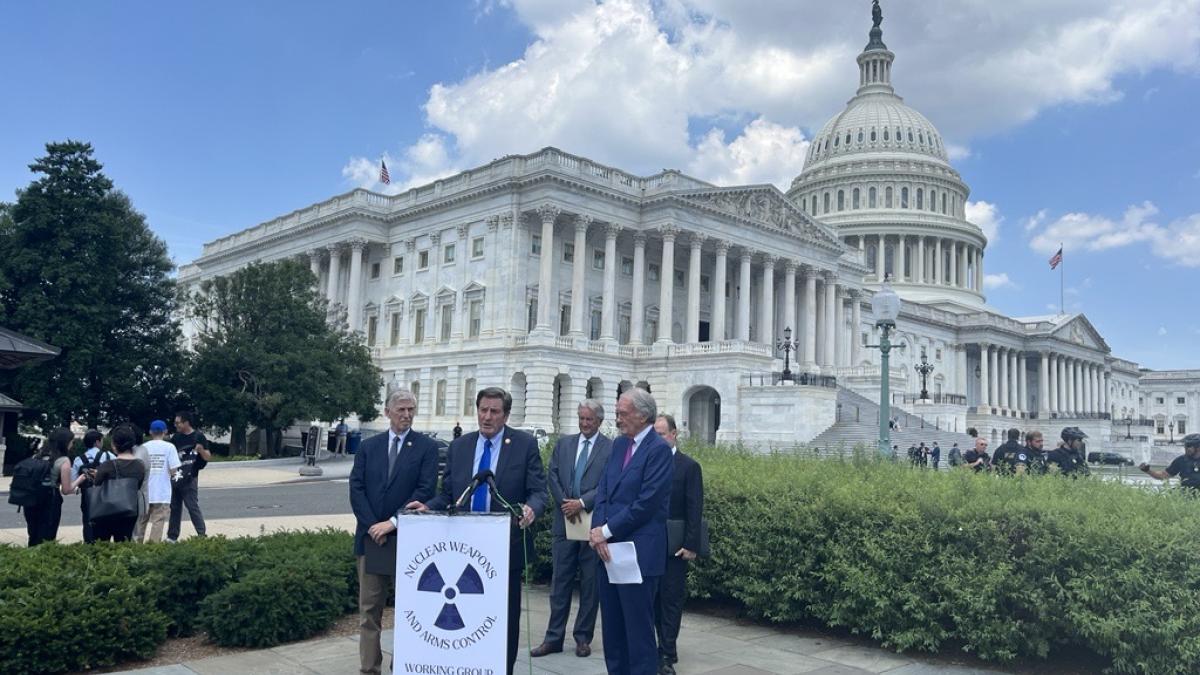Congressional Nuclear Weapons and Arms Control Working Group Announce Additional Oversight of U.S. Nuclear Weapons Spending

WASHINGTON, DC— Today, Senator Edward J. Markey (D-Mass.) and Representatives John Garamendi (D-CA-08) and Don Beyer (D-VA-08), co-chairs of the Congressional Nuclear Weapons and Arms Control Working Group, announced a working group hearing on cost overruns of nuclear modernization programs on July 24th, 2024. Additionally, the co-chairs announced a forthcoming letter to Secretary of Defense Lloyd Austin on concerns that the Department of Defense (DoD) is not completing a thorough assessment of alternatives for the Sentinel program, the ground-based component of the nuclear triad.
“Historically, nations have collapsed by overspending on outdated defense strategies, and I fear the United States is repeating these mistakes. Each year, we approve increased spending without ensuring it enhances stability and security. These programs are unnecessary and costly mistakes at the expense of the U.S. taxpayer and further precipitate the modern nuclear arms race between the U.S., Russia, and China. Regrettably, the majorities in the House and Senate Armed Committees have yet to provide the necessary oversight to keep our country safe and avoid a nuclear arms race. I am grateful to my Nuclear Weapons and Arms Control Working Group colleagues for assuming this responsibility with our forthcoming hearing and letter to Secretary Austin,” said Garamendi.
“The United States cannot preach temperance from a bar stool. We have a responsibility to prevent the heightened threat of nuclear war. I will continue to work with my Nuclear Weapons and Arms Control Working Group colleagues and other Members across both chambers to seek more transparency from our government on the Sentinel Program, and stop the insane spending on nuclear weapons. We need to get rid of the redundant and dangerous Ground-based Strategic Deterrent leg of our nuclear triad,” said Markey.
“As the world has changed since I began my career as a nuclear weapons policy analyst at the Pentagon and Congressional Budget Office, the costs associated with nuclear weapons have never been higher,” said Merkley. “Right now, the United States is spending billions of dollars in nuclear weapons with limited oversight and accountability. As cost overruns continue to mount, Congress must rein in out-of-control nuclear weapons spending and work towards solutions that strengthen our security responsibly.”
“The NDAA advanced by the House Armed Services Committee would continue spending hundreds of billions of dollars on unnecessary programs that have little benefit for our national security, while doing nothing to advance arms control efforts,” said Beyer. “It is the height of irresponsibility to continue pouring money into such programs when cheaper and similarly effective alternatives exist. Anyone who has real concerns about our fiscal trajectory or entering into a dangerous new nuclear arms race should object to these provisions and support additional oversight of our nuclear weapons programs.”
On January 18th, 2024, Congress was notified that the Air Force’s Sentinel program experienced a 37% increase over the baseline cost and was estimated to cost over $131 billion. This triggered a Nunn-McCurdy review, which legally requires the DoD to conduct a comprehensive study to determine the reason for the increase, the necessity of the new missile and bomb, alternatives, and which other important programs must be cut or delayed to pay for the escalating cost.
On May 22nd, 2024 the House Armed Services Committee held a markup of the National Defense Authorization Act (NDAA), during which several members sounded the alarm on the rising cost of the Sentinel program and other nuclear weapons programs. Despite these concerns, the committee passed provisions supporting these programs.
A transcript and recording of the press conference can be found here.
###